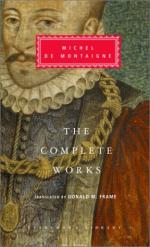
|
| Name: _________________________ | Period: ___________________ |
This test consists of 15 multiple choice questions and 5 short answer questions.
Multiple Choice Questions
1. The journeys that Montaigne describes in his travel journal mostly occurred between what years?
(a) 1580 and 1581.
(b) 1520 and 1522.
(c) 1601 and 1603.
(d) 1550 and 1551.
2. What city did Guiseppe serve when Montaigne met him?
(a) Tours.
(b) Genoa.
(c) Rome.
(d) Vienna.
3. What types of things does Montaigne believe cannot be repented for?
(a) Violent crimes.
(b) Intentional murders.
(c) Things outside of one's control.
(d) Blasphemies.
4. Montaigne says that women know more than men about what?
(a) Everything.
(b) Housework.
(c) Love.
(d) The fields.
5. Montaigne treated women without what?
(a) Understanding.
(b) Tolerance.
(c) Disrespect.
(d) Empathy.
6. Montaigne says that the Roman dishes are superior to French dishes made of what?
(a) Copper.
(b) Clay.
(c) Pewter.
(d) Wood.
7. In what month did Montaigne arrive in Rome?
(a) November.
(b) September.
(c) March.
(d) June.
8. What was the main motivation of the journeys that Montaigne describes in his travel journal?
(a) Fame.
(b) Curiosity.
(c) Religious pilgrimage.
(d) Profit.
9. Montaigne writes that a wife should treat her husband as if he were what?
(a) Her father.
(b) Her pet.
(c) Her master.
(d) An equal.
10. Which ancient Greek philosopher had a great affect on Montaigne?
(a) Sophocles.
(b) Socrates.
(c) Aristotle.
(d) Plato.
11. What is Montaigne's opinion of his own performance as a husband compared to his expectations?
(a) He surpassed his expectations.
(b) He just barely met his expectations.
(c) He failed to meet his expectations.
(d) His performance was totally different from his expectations.
12. What scholar is quoted in the opening of Book 2 of Essays: Essay #1?
(a) Hume.
(b) Terrence.
(c) Smith.
(d) Kant.
13. Montaigne says that the ancient writer that he discusses near the beginning of Book 3 of Essays: Chapter 11 is extremely what?
(a) Conservative.
(b) Progressive.
(c) Versatile.
(d) Intelligent.
14. The "truth" that Montaigne speaks of in the essay in Book 2 of Essays, "Of Repentance" is best described as what?
(a) An illusion.
(b) Relative.
(c) Objective.
(d) Consensus reality.
15. Montaigne is particularly interested in what quality of the waters of different regions?
(a) Clarity.
(b) Hardness.
(c) Flavor.
(d) Color.
Short Answer Questions
1. Montaigne is impressed by Roman dishes that are made of what material?
2. Book 3 of Essays contains how many essays?
3. What ancient writer does Montaigne discuss near the beginning of Book 3 of Essays: Chapter 11?
4. Which philosopher does Montaigne most often quote?
5. What was the name of the location that Montaigne stayed at in Rome?
|
This section contains 361 words (approx. 2 pages at 300 words per page) |

|




